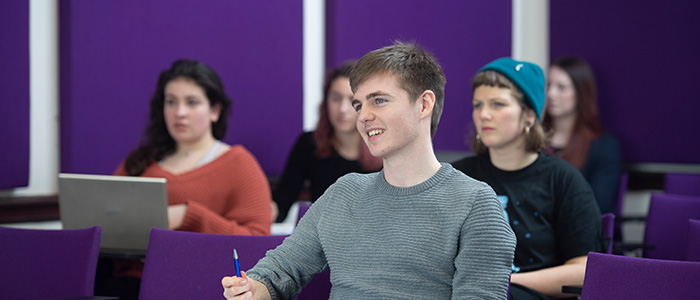Information Studies PhD/MLitt (Research)/MPhil (Research)/MRes
Information Studies has a vibrant research culture with a growing number of doctoral and masters students, exploring a range of topics in the fields of information studies, museology, digital culture and digital humanities.
- PhD: 3 years full-time; 5 years part-time; Thesis of 70,000-100,000 words
- MLitt (Research): 2 years full-time; 3 years part-time; Thesis of 40,000-70,000 words
- MPhil (Research): 1 year full-time; 2 years part-time; Thesis of 30,000-40,000 words
- MRes: 1 year full-time; 2 years part-time; Thesis of 20,000-30,000 words
Overview
Information Studies has a vibrant research culture that investigates a range of topics in the fields of information studies and digital culture, and digital humanities. Rapid technological change, massive volumes of digital information of increasing complexity pose significant challenges to our individual and collective use and curation of information. Fundamental concepts such as identity, memory, authenticity, trust, transparency, accountability, representation, engagement, preservation and access are important aspects of information studies in a digital era. These concerns demand a fresh theoretical approach, a deeper understanding of the nature of information and innovative solutions that connect theory with practice, people with information, and technology with humanity.
Our research focuses on the following areas:
Theoretical approaches to information
Issues of post-modernism, relativism, and information processing in both computational and post-computational frameworks.
Staff: Tim Duguid, Yunhyong Kim
Management, Curation and Evaluation of Digital Assets
Information Studies has longstanding and internationally recognised research strengths in digital preservation, curation and data management, with a particular emphasis on collaborative, translational research in national and international digital asset management. Our research considers the complex questions that surround our ICT-enabled audit and compliance cultures, and particularly the relationship with such facilities as automation, the semantic web, social networking and mobile devices, Artificial Intelligence, and the use and re-use of digital content and data.
Staff: Yunhyong Kim, Ann Gow, Ian G Anderson, Lorna Hughes, Paul Gooding
Archive, Records and Information Management
Information Studies carries out research on archive, records and (personal) information management (RIM), and had established a track record of externally funded research projects in this area. Information Studies at the University of Glasgow has pioneered a risk-based approach to research and learning in this area that distances us from the existing literature, and crucially places ARIM at a strategic level within organisations.
Staff: Adele Redhead
Digital Cultural Heritage and Digital Museology
Information Studies staff have been engaged in a number of innovative projects to create digital access to cultural heritage assets, conducting research on all aspects of the construction and use of knowledge in a digital age. Information Studies research has a particular focus on the design and presentation of interactive and participatory online resources, the use of digital collections for research, teaching, and public engagement, and the use of digital approaches for constructing heritage narratives.
Staff: Maria Economou, Johanna Green, Katherine Lloyd
Information policy, ethics, and law
Our research interests in this area encompass information law and ethics, including intellectual freedom, and freedom of expression, freedom of access to information, digital citizenship, privacy and surveillance, and the philosophy of information. Our interests in the area apply across all domains, including cultural heritage institutions like libraries, archives, and museums, as well as in the digital realm, including social media. We are happy to discuss with prospective research students how to explore these topics from a multitude of theoretical perspectives.
Staff: Dr David McMenemy
Digital Humanities and Arts
The University of Glasgow is a foundational location for Digital Humanities, with many pioneers in the field based at Glasgow. We welcome applications from prospective students interested in researching the core principles of digital humanities: digital content, tools and methods, and the development of the practice of digital humanities as an important intervention in the research life cycle in the humanities: to carry out ‘traditional’ research more effectively; to create deeper and richer engagement with primary sources; and to configure new and innovative research questions. We especially welcome those studying the theoretical consequences of using digital approaches, and the implications the digital in the arts and humanities.
Many University of Glasgow innovations in digital humanities are documented through the Glasgow Digital Humanities Network.
Staff: Paul Gooding
Topics of particular interest
Information Studies places great emphasis on the relationship of theory and practice in the information society drawing on a range of disciplinary perspectives and experience from different parts of the globe. Research students are expected to join the departmental research seminars and contribute to discussion and publications, and make an active contribution to the research environment in the subject area. Staff are always delighted to discuss research proposals and ideas with prospective students. Topics of particular interest within these areas include:
- Digital media in cultural heritage (ranging from behind the scenes collection information systems to social media and mobile apps for interpretation)
- Visitor studies and evaluation of information use
- Digital collections: use, value and impact
- The transformation of archival practice
- Digital manuscripts and advanced imaging
- The use of digital tools and methods in humanities and arts research
- Citizen science and crowdsourcing
- Multimedia Tools and Applications (ranging from music analysis to lifelogging)
- Record keeping, archives, and accountability
- Gamification in heritage settings and beyond
Study options
PhD
- Duration: 3 years full-time; 5 years part-time
- Thesis length: 70,000-100,000 words, including references, bibliography and appendices (other than documentary appendices).
A Doctor of Philosophy may be awarded to a student whose thesis is an original work making a significant contribution to knowledge in, or understanding of, a field of study and normally containing material worthy of publication.
MLitt (Research)
- Duration: 2 years full-time; 3 years part-time
- Thesis length: 40,000-70,000 words (including references, bibliography and appendices).
Our Degree of Master of Letters (Research) requires you to undertake a postgraduate course of special study and research that represents a distinct contribution to knowledge.
MPhil (Research)
- Duration: 1 year full-time; 2 years part-time
- Thesis length: 30,000-40,000 words (including references and bibliography).
A Master of Philosophy (Research) requires you to undertake a postgraduate course of special study and research that represents a distinct contribution to knowledge.
MRes
- Duration: 1 year full-time; 2 years part-time
- Thesis length: 20,000-30,000 words (including references, bibliography and appendices).
Our Master of Research includes both taught and research elements. You will be required to undertake 60 to 80 credits worth of taught courses as well as independent study which represents some contribution to knowledge.
Distance Learning
It may be possible to undertake a postgraduate research degree (with the exception of MRes) in the College of Arts and Humanities by distance learning. If you wish to explore this option, you should discuss it initially with your proposed supervisor.
Entry requirements
Our regular standard of admission is at least an Upper Second Class Honours degree (2:1), although candidates will usually also have completed or be undertaking a Masters qualification.
Research outline
Candidates are required to provide an outline of the proposed research subject in about 1000 words. This need not be your final thesis proposal but should include:
- a straightforward, descriptive, and informative title
- the question that your research will address
- an account of why this question is important and worth investigating
- an assessment of how your own research will engage with recent study in the subject
- a brief account of the methodology and approach you will take
- a discussion of the primary sources that your research will draw upon, including printed books, manuscripts, archives, libraries, or museums
- an indicative bibliography of secondary sources that you have already consulted and/or are planning to consult
Your application, including your references and research proposal, will be passed to members of staff whose expertise and research interests most closely match the area of your proposed study.
English language requirements
For applicants whose first language is not English, the University sets a minimum English Language proficiency level.
International English Language Testing System (IELTS) Academic module (not General Training)
- International English Language Testing System (IELTS) Academic module (not General Training)
7.0 with no subtests under 7.0 - Tests must have been taken within 2 years 5 months of start date. Applicants must meet the overall and subtest requirements using a single test.
Common equivalent English language qualifications
TOEFL (ibt, my best or athome)
- 94; with Reading 24; Listening 24; Speaking 23; Writing 27
- Tests must have been taken within 2 years 5 months of start date. Applicants must meet the overall and subtest requirements , this includes TOEFL mybest.
Pearsons PTE Academic
- 66 with no subtest less than: Listening 66;Reading 68; Speaking 65; Writing 82
- Tests must have been taken within 2 years 5 months of start date. Applicants must meet the overall and subtest requirements using a single test.
Cambridge Proficiency in English (CPE) and Cambridge Advanced English (CAE)
- 185 overall, no subtest less than 185
- Tests must have been taken within 2 years 5 months of start date. Applicants must meet the overall and subtest requirements using a single test.
Oxford English Test
- Oxford ELLT 8
- R&L: OIDI level no less than 8 with Reading: 27-28 and Listening: 20
- W&S: OIDI level no less than 8
Trinity College Tests
Integrated Skills in English II & III & IV: ISEII Pass with Pass in all sub-tests.
University of Glasgow Pre-sessional courses
Tests are accepted for 2 years following date of successful completion.
Alternatives to English Language qualification
- Degree from majority-English speaking country (as defined by the UKVI including Canada if taught in English)
- students must have studied for a minimum of 2 years at Undergraduate level, or 9 months at Master's level, and must have complete their degree in that majority-English speaking country and within the last 6 years
- Undergraduate 2+2 degree from majority-English speaking country (as defined by the UKVI including Canada if taught in English)
- students must have completed their final two years study in that majority-English speaking country and within the last 6 years
For international students, the Home Office has confirmed that the University can choose to use these tests to make its own assessment of English language ability for visa applications to degree level programmes. The University is also able to accept UKVI approved Secure English Language Tests (SELT) but we do not require a specific UKVI SELT for degree level programmes. We therefore still accept any of the English tests listed for admission to this programme.
Fees and funding
Fees
2024/25
- UK: £4,786
- International & EU: £25,290
Prices are based on the annual fee for full-time study. Fees for part-time study are half the full-time fee.
Irish nationals who are living in the Common Travel Area of the UK, EU nationals with settled or pre-settled status, and Internationals with Indefinite Leave to remain status can also qualify for home fee status.
Alumni discount
We offer a 20% discount to our alumni on all Postgraduate Research and full Postgraduate Taught Masters programmes. This includes University of Glasgow graduates and those who have completed Junior Year Abroad, Exchange programme or International Summer School with us. The discount is applied at registration for students who are not in receipt of another discount or scholarship funded by the University. No additional application is required.
Possible additional fees
- Re-submission by a research student £540
- Submission for a higher degree by published work £1,355
- Submission of thesis after deadline lapsed £350
- Submission by staff in receipt of staff scholarship £790
Depending on the nature of the research project, some students will be expected to pay a bench fee (also known as research support costs) to cover additional costs. The exact amount will be provided in the offer letter.
- College of Arts & Humanities Graduate School funding opportunities
- MRes Scholarship: Creativity, Inclusion and the Virtual
Support
Resources
Teaching and research in the Arts and Humanities is supported by the outstanding resources of our University Library with its special collections and our on-campus Hunterian Museum and Art Gallery.
Our close links and partnerships with Glasgow Life, and the city’s many museums, art galleries, performing arts and music venues, international festivals and creative industry organisations make the University of Glasgow the ideal place for postgraduate study of the arts.
Graduate School
Our Graduate School creates a productive and interdisciplinary collegiate environment for all of our research students. We offer a range of services, courses and skills development opportunities for research students.
The College of Arts & Humanities is home to a vibrant and diverse community of students enrolled on taught masters and research programmes within a stimulating intellectual and cultural environment. Across every school and subject area the college is home to world-leading and agenda-setting research.
Find out more about what is happening in the community by following us:
You will also be part of the wider Scottish Graduate School for Arts and Humanities, the world's first national graduate school in the Arts & Humanities. Membership includes 16 Scottish universities, four art schools & the national conservatoire, with support from the arts, culture, creative & heritage sectors.
How to apply
Identify potential supervisors
All Postgraduate Research Students are allocated a supervisor who will act as the main source of academic support and research mentoring. You may want to identify a potential supervisor and contact them to discuss your research proposal before you apply. Please note, even if you have spoken to an academic staff member about your proposal you still need to submit an online application form.
You can find relevant academic staff members with our staff research interests search.
Gather your documents
Before applying please make sure you gather the following supporting documentation:
- Final or current degree transcripts including grades (and an official translation, if needed): scanned copy in colour of the original document.
- Degree certificates (and an official translation, if needed): scanned copy in colour of the original document.
- Two references on headed paper and signed by the referee. One must be academic, the other can be academic or professional. References may be uploaded as part of the application form or you may enter your referees contact details on the application form. We will then email your referee and notify you when we receive the reference. We can also accept confidential references direct to rio-researchadmissions@glasgow.ac.uk, from the referee’s university or business email account.
- Research proposal, CV, samples of written work as per requirements for each subject area.
- For Distance Learning study option only - completed CoAH Distance Learning PGR application statement form
Contact us
- If you have any questions about your application before you apply: contact The School of Humanities at humanities-pgadmissions@glasgow.ac.uk
- If you have any questions after you have submitted your application: contact our Admissions team
- Any references may be submitted by email to: rio-researchadmissions@glasgow.ac.uk
International Students

Our research environment




